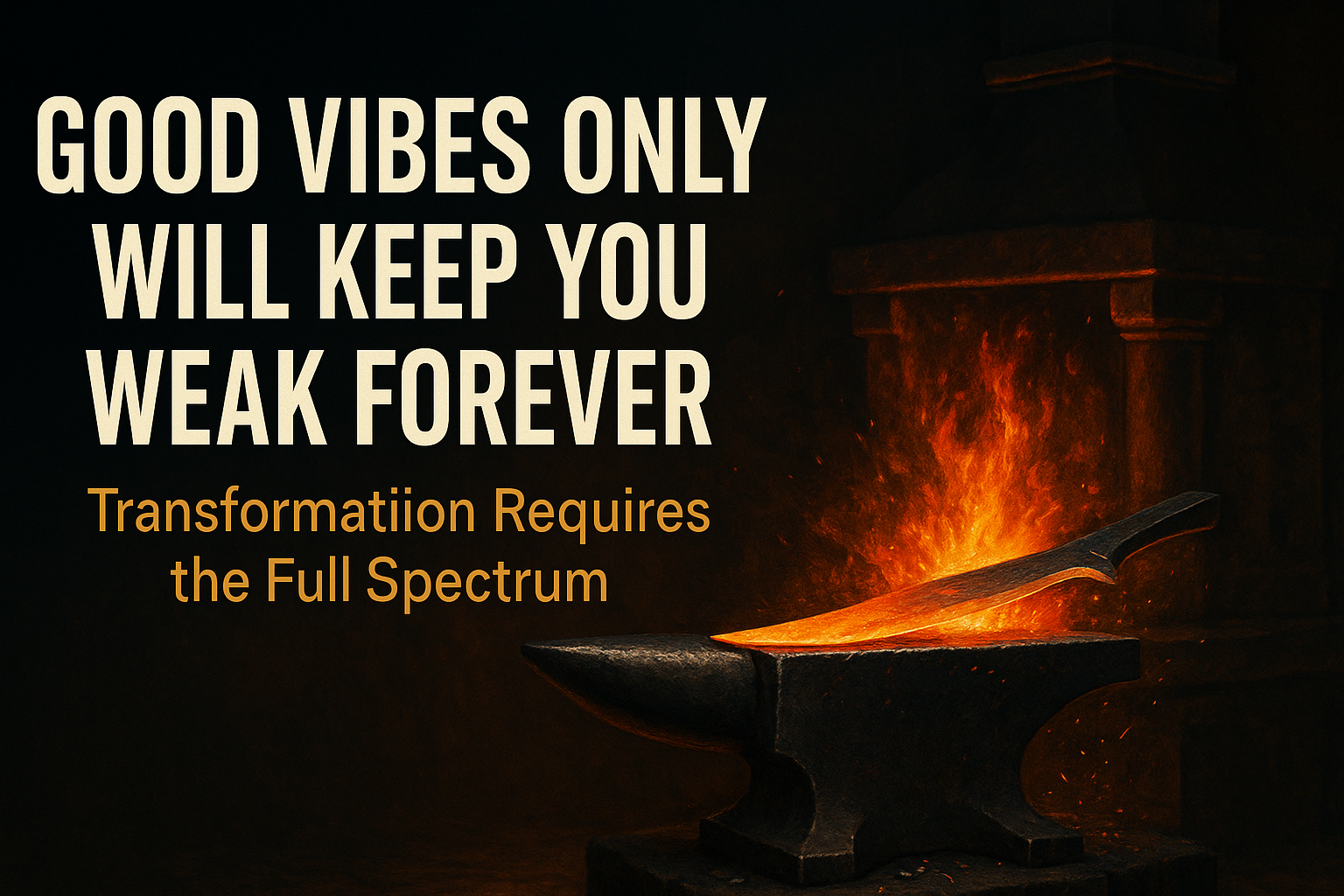
Good Vibes Only Will Keep You Weak Forever
By Derek Neighbors on November 4, 2025
I lost a big contract. Six figures. The kind that changes a quarter’s numbers.
My immediate response? Good vibes mode. “Everything happens for a reason.” “The right opportunities will come.” “Let’s focus on what’s next.” I stuffed the anger and hurt down and pivoted to manufactured positivity about future prospects.
For about two weeks, I rode that wave. Felt spiritual about it. Evolved. Above the disappointment.
Then I crashed. Hard.
Because the anger and resentment I’d been suppressing didn’t disappear, they just went underground. And with them went all the information they were trying to give me about what went wrong, what I needed to address, what shortcomings I needed to face.
When I finally let myself actually feel it, the frustration at how I’d handled the pitch, the resentment at the client’s decision, the fear about what it meant for the business, something shifted. Not immediately. Not comfortably. But real.
The anger showed me where I’d been sloppy in the proposal. The resentment revealed assumptions I’d made about the relationship. The fear clarified what actually mattered about winning that contract.
Those difficult emotions became fuel. Not the inspirational poster kind. The actual combustible material that powers transformation.
Here’s what I’m still wrestling with: I’m good at processing failure now. What I’m not good at is letting people see me process it in real time. I still perform evolution instead of living through it. I share the cleaned-up version after I’ve extracted the lesson. That’s its own form of “good vibes only”, just with better philosophical branding.
That’s when I understood: Good vibes only doesn’t protect you from negativity. It protects you from growth. And so does waiting to be “healed” before you’re honest about being broken.
The Myth
Here’s what the “good vibes only” movement sells: Maintaining positive energy and high vibes accelerates personal growth and transformation. Successful, evolved people choose positivity and transcend negative emotions.
You see it everywhere:
“Choose gratitude over complaining.”
“What you focus on expands, focus on the positive.”
“High vibration attracts high vibration.”
“Everything happens for a reason.”
“Only good vibes allowed here.”
“Negativity is toxic, protect your peace.”
The logic appears sound. If you spend time dwelling on negative emotions, you stay stuck in negativity. If you shift focus to positive thoughts, you create positive momentum. Gratitude journals, affirmations, and maintaining positive energy feel productive. They feel like growth work.
Plus, nobody wants to be around negative people. Positivity feels better, attracts better opportunities, and creates better outcomes. The correlation between positive mindset and success seems obvious.
The Greeks even talked about apatheia (inner peace) and eudaimonia (flourishing). Surely that means transcending difficult emotions, right?
The Reality Check
Wrong.
When you suppress difficult emotions in favor of manufactured positivity, three things happen:
First, the emotions go underground.
They don’t disappear. They accumulate. The anger you positive-thought away resurfaces as passive-aggressive behavior. The grief you gratitude-journaled past becomes numbness. The fear you “chose not to focus on” becomes anxiety about maintaining your positive facade.
Second, you miss critical information.
Every difficult emotion carries intelligence:
- Anger signals boundary violations or values being compromised
- Grief processes loss and makes space for what’s next
- Fear clarifies what actually matters to you
- Frustration reveals gaps between your standards and your execution
- Resentment exposes unspoken expectations
When you bypass these emotions, you lose access to their information.
Third, your capacity shrinks.
Each time you avoid difficulty, you train yourself to need narrower conditions to function. The person who quits every job that creates stress. The leader who can’t handle team conflict. The entrepreneur who pivots at the first sign of resistance.
Your window of tolerance doesn’t expand through avoidance. It contracts.
Watch it play out:
The CEO who responds to layoffs with “right-sizing for growth” messaging while employees watch colleagues escorted out. The team knows it’s gaslighting, not leadership.
The Instagram influencer sharing “vulnerable” moments that are perfectly curated, edited, and paired with affiliate links. Performance of authenticity, not actual authenticity.
The parent who shields children from every discomfort in the name of protecting their peace, then wonders why their teenagers can’t handle normal stress.
The entrepreneur who loses a deal and immediately pivots to “everything happens for a reason” without examining what went wrong. Six months later, they lose another deal to the same pattern they never identified.
And here’s one that doesn’t resolve neatly: The executive who finally allowed themselves to feel the full weight of their company’s dysfunction. The anger at years of compromised values. The grief over talent they’d lost. The fear that they’d become complicit.
They’re still sitting with it. No clean lesson yet. No redemption arc. Just the slow, uncomfortable work of figuring out what comes next when you stop pretending everything is an opportunity.
The Hidden Cost
The “good vibes only” approach creates progressive fragility. It doesn’t build resilience, it builds increasing sensitivity to difficulty. Each avoided emotion makes the next one harder to face. People become less capable over time, not more.
Real transformation requires destruction of the old identity. The Greeks understood metanoia (transformation) as fundamental change, not surface adjustment. You can’t fundamentally change while maintaining constant comfort. Real growth happens through processing difficulty, not bypassing it.
When leaders force positivity, teams learn to hide problems. When friends only accept “good vibes,” people perform emotion instead of processing it. When parents model emotional avoidance, children never learn emotional processing.
The result: Relationships and organizations filled with silent suffering and surface-level engagement.
Here’s what’s particularly insidious: “Good vibes only” takes legitimate spiritual concepts and weaponizes them against growth.
The wellness industry sells you apatheia (inner peace) as emotional numbness. They tell you the Stoics transcended negative emotions. That’s not what Seneca wrote. He wrote about sitting with his anger until he understood it. Processing his grief over exile, not bypassing it with gratitude journaling.
Epictetus didn’t become free from emotional pain by thinking positively. He developed his philosophy while enslaved, processing the full weight of his circumstances, extracting wisdom from suffering, not pretending it away.
Pop Stoicism sells you emotional avoidance dressed in ancient language. Real Stoicism demands you process everything and let none of it control you. There’s a massive difference.
And here’s the part nobody wants to say: many environments reward this dishonesty. Coaches who need you comfortable to keep paying. Leaders who need teams compliant. Communities that prioritize harmony over truth. They profit from your performance of positivity.
What it prevents:
- Learning from failure
- Building genuine resilience
- Developing emotional intelligence
- Creating authentic relationships
- Achieving real transformation
The Truth
The Greeks had it right: pathemata mathemata, through suffering comes learning. Not around it. Through it.
The people who actually transform don’t transcend difficult emotions. They process them and extract the wisdom they contain.
They sit with anger long enough to understand what it’s protecting. They face grief long enough to process what was lost. They acknowledge fear long enough to discover what they actually value. They feel frustration long enough to identify what needs to change.
Stop curating your emotional experience for others’ comfort. Feel what you actually feel. The anger at the client who wasted your time. The grief of the opportunity lost. The fear about what it means for your business.
Before you pivot to “everything happens for a reason,” sit with what actually happened. What information is this emotion giving you? What boundary was violated? What expectation was unmet? What value was compromised?
Your window of tolerance expands by facing difficulty, not avoiding it. The Spartans didn’t train in comfortable conditions. They trained in the conditions they’d face in battle. Andreia (courage) isn’t fearlessness, it’s feeling fear and acting anyway.
Aletheia (truth/unhiddenness) was sacred to the Greeks. Leaders who acknowledge hard truths build trust. Leaders who hide behind positive language destroy it. Hesiod wrote about speaking truth even when it’s harsh, that’s real leadership.
This approach builds actual strength instead of performed strength. It creates genuine transformation instead of comfortable stagnation. It develops real resilience instead of progressive fragility.
The wisdom doesn’t come from maintaining positive vibes. It comes from processing the full spectrum of human experience and extracting truth from all of it.
The Shift
Start simple.
Week One: Stop Performing
For one week, stop managing your emotional image. Feel what you feel without immediately reframing it. Notice how much energy you’ve been spending on maintaining a positive facade.
The Practice:
Pause before reframing. When difficult emotion arises, pause before pivoting to “everything happens for a reason.”
Name what you actually feel. Anger, grief, fear, frustration, resentment, use the real words.
Ask what it’s telling you. What information does this emotion carry? What boundary, value, or expectation is involved?
Act from truth. Make decisions based on what’s actually true, not what maintains positive energy.
The Resistance You’ll Face:
“But won’t this make me negative?”
No. Processing difficult emotions makes you honest. Suppressing them makes you fragile with a positive veneer.
“What about attracting what you focus on?”
You’re not dwelling on negativity. You’re extracting information from it and moving forward with clarity. Big difference.
“Won’t people think I’m not spiritual or evolved?”
People who’ve done real transformation work recognize the difference between processing and performing. The ones who haven’t will judge either way.
What Changes:
You’ll notice the anger passes faster when you feel it instead of suppress it. The grief processes when you acknowledge it instead of gratitude-journal over it. The fear clarifies what matters when you face it instead of positive-think around it.
Those difficult emotions become fuel for actual transformation instead of weights you carry underground.
Final Thoughts
The forge demands all of you, your joy AND your grief, your hope AND your fear, your confidence AND your doubt.
Seneca wrote his most profound insights while in exile. Marcus Aurelius found clarity in the middle of war and plague. Epictetus developed his philosophy while enslaved.
They didn’t wait for “good vibes only” conditions. They processed the full spectrum of human experience and extracted wisdom from all of it.
Can you name a real transformation that happened through comfort? Or did every meaningful change require temporary darkness?
When was the last time you felt angry, and what did you do with it? Process it or positive-think it away?
Who in your life are you not allowed to have difficult emotions around? What does that cost you?
Your “good vibes only” approach isn’t protecting you from negativity. It’s protecting you from growth.
Real transformation requires embracing the full spectrum of human experience. MasteryLab provides the frameworks and community for people ready to stop performing positivity and start building actual strength through honest emotional engagement.



